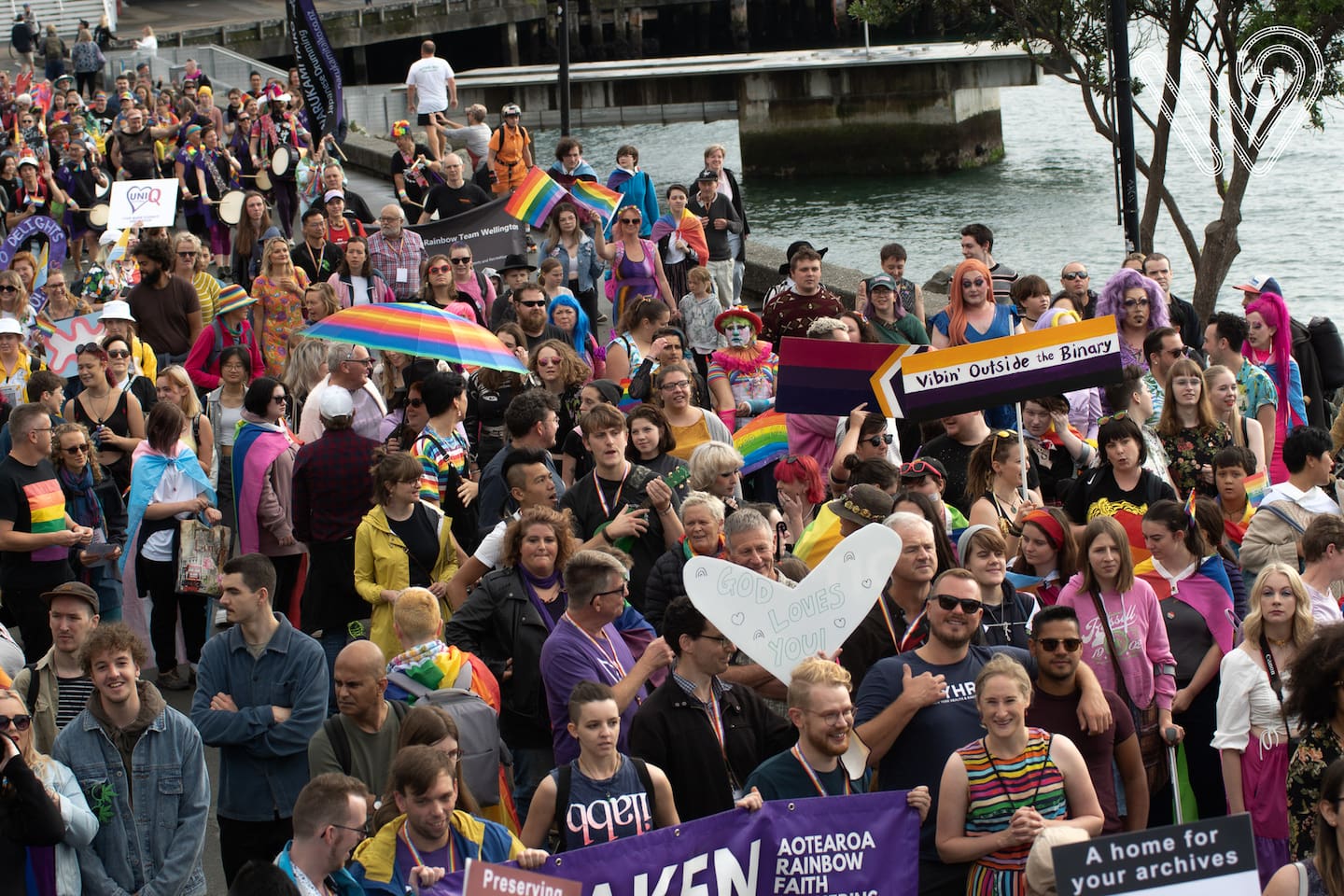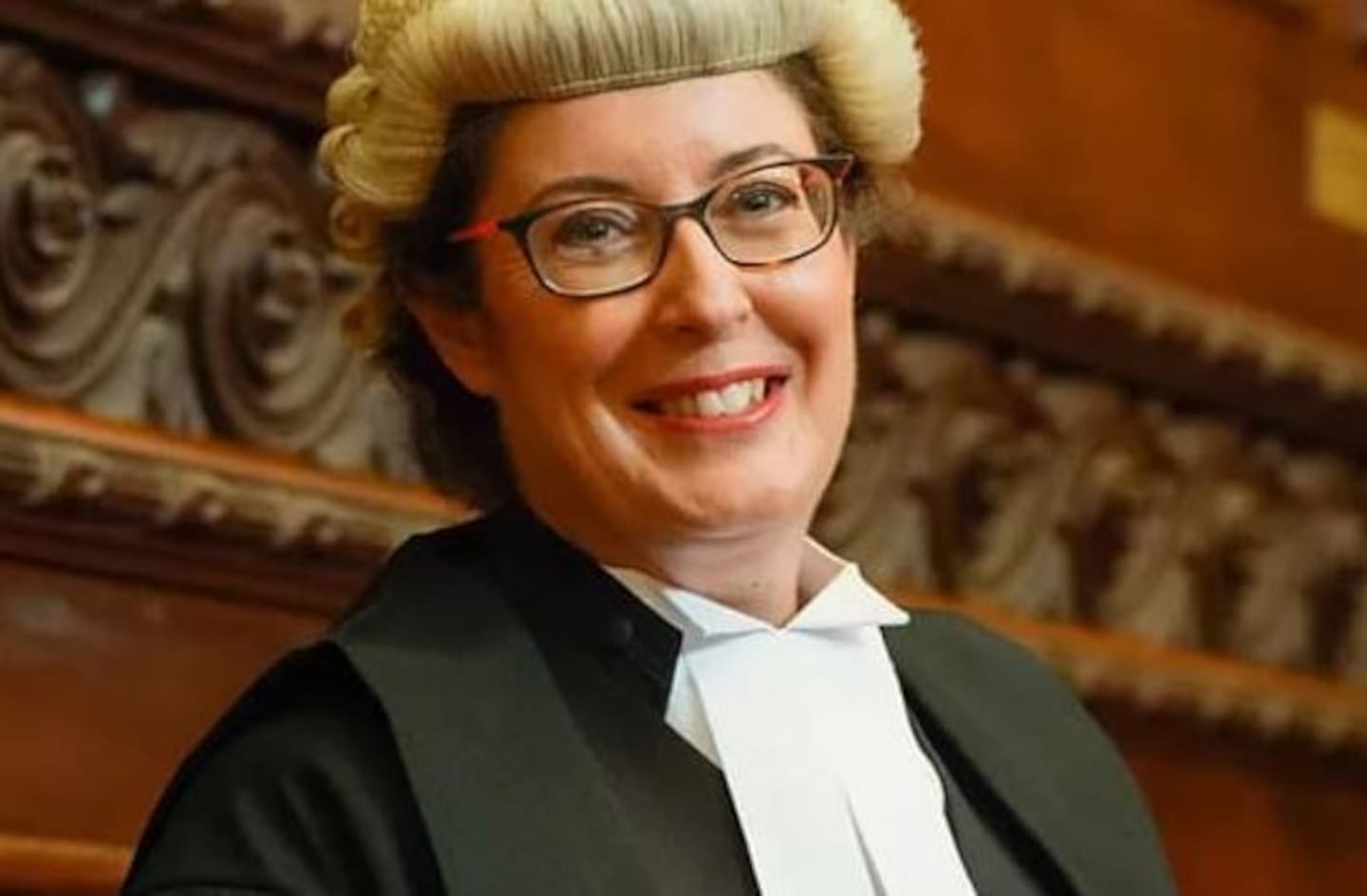

A stoush over a stall at a Wellington Pride event has left some people with hurt feelings, exposed differing opinions about gender identity and resulted in a discrimination claim.
Lesbian Action for Visibility Aotearoa (Lava) complained after the Wellington Pride Festival cancelled its stall at the Wellington Pride event in March 2021.
But Wellington Pride says it cancelled the stall because Lava is a public advocacy group promoting anti trans (trans exclusionary) views.
Now the case has ended up in the Human Rights Review Tribunal.
Marg Curnow and Hilary Oxley, on behalf of Lava, have asked the tribunal to issue a declaration that Wellington Pride unlawfully discriminated against the group when it cancelled the stall booking based on Lavaãs gender-critical political opinions.
Over the past two days, the parties have presented their closing submissions to a four-person panel at the Wellington District Court.
Hilary Oxley and Margaret Curnow, members of Lesbian Action for Visibility in Aotearoa (Lava).
Out in the City
According to Lavaãs statement of claim, Wellington Pride publicly advertised its annual ãOut in the Cityã fair, inviting groups to book stalls, in December 2020.
Lava booked and paid for a stall, intending to display a large map showing places of historical, political, and social significance around Wellington, to raise awareness of community history and culture, and to inspire younger lesbians.
In early March 2021, Lava protested outside the Ministry for Women on International Womenãs Day, waving placards saying: ãFemale is not a feeling. Donãt skew data. Biology is factã and ãWomen = adult human femaleã, a phrase used by British anti transgender campaigner Kellie-Jay Keen-Minshull (also known as Posie Parker).
Members of the LGBT community alerted Wellington Pride to Lavaãs views about trans women, forwarding the protest photos.
Lava then received an email from Wellington Pride cancelling the stall.
When pressed on its decision, Wellington Pride said it supported societyãs most marginalised, including transgender whánau.
ãWe believe that any organisation involved in the Pride Festival should be standing side by side with our most marginalised in our communitiesã, Vivian Lyngdoh, Pride board chair and festival organiser, told Oxley.
Wellington Pride disagreed with Lavaãs views and its opinions, which, according to the statement of claim, implied that trans women are not women and so cannot be lesbians.
The statement said Wellington Pride also understood Lavaãs views included that trans women should not be permitted in spaces reserved for females, including changing rooms, prisons, and refuges.
As a result, Wellington Pride said trans people wouldnãt feel ãsafeã if Lava representatives were at the fair.

Wellington Pride Festival.
Lava members were distressed and hurt by the cancellation, arguing the stall was never going to reference the different opinions between Lava and Wellington Pride regarding trans women, or promote Lavaãs opinion on the issue.
They say they were discriminated against based on their political opinions.

Nicolette Levy, KC, is representing Lava before the Human Rights Review Tribunal.
You cannot discriminate for peopleãs thoughts
Barrister Nicolette Levy, KC, representing Lava, said Pride argued it wanted to provide a safe space for trans people, but what really occurred was the exclusion of a small group of lesbians merely for holding an unwelcome political view.
Lava is part of the Pride community, she said. Being inclusive meant including lesbians with all political views, and not excluding people simply because of their thoughts and beliefs.
ãYou cannot discriminate based on what political views they hold in their heads ã which you will only know if they have previously manifested them, and which may or may not be known or well known to the public ã any more than you can discriminate against them [for] being old or Greek or disabled or Anglican.ã
Levy said while Pride knew about Lavaãs views, Lava knew the fair wasnãt a political event and planned to display only the map at their stall. Organisers didnãt engage with Lava to discuss the parameters of its participation.
ãNo attempt was made to ascertain whether the content of the Lava stall would reflect the political opinions to which Pride objected,ã she said.
Lava did not intend to be provocative or to speak its ãtruthsã to people not interested in hearing them.
ãLava does not accept that their views were deeply unwelcome to all within the rainbow community. The ãhard conversationsã, which Wellington Pride said they were there for, include how groups with different views can exist in the community together, as they have done in the past,ã she said.
More broadly, Levy submitted, Lavaãs ãtrans exclusionaryã views were well known by Prideãs board, and were a ãstandard setã of gender critical political opinions which centred on the harms caused to womenãs rights and language by allowing males to identify as women by references to an internal feeling.
The evidence had shown that gender critical views are not about hate, and donãt include that trans people ãdonãt existã, she said.
ãThey are about maintaining existing same-sex protections and language, for the benefit of women.
ãSociety does, and must, tolerate those views, and also the rights of trans people to advocate for solutions that maximise their ability to flourish in society.ã
The barrister said it wasnãt Lavaãs position that gender diversity shouldnãt be accommodated.
While Lava opposed trans women using womenãs spaces, she said that didnãt mean it believed trans women couldnãt be a part of society, pointing out that as far back as the 1980s, Lava recognised that trans sexuals needed protection from discrimination.
In any event, the problem was for society to solve, with third spaces or open categories. Women asserting their own rights are not required to have all the answers, she said.
Victoria Casey, KC, is representing Wellington Pride before the Human Rights Review Tribunal. Photo / RNZ
Public advocacy, not private opinions, the problem
It was a point Prideãs representative, Victoria Casey, KC, challenged, saying Lavaãs closing submissions focused on the protection of single sex spaces for (cis) women.
Lava believed that if society acknowledged trans women as women, that would leave no space for cis women to exclude trans women.
ãThis is simply wrong. The Human Rights Act has always allowed for these type of exceptions, where justified in human rights terms. Acknowledging trans women as women doesnãt and hasnãt changed that.ã
She also took issue with Lavaãs claim that the group planned to display only a map at the stall, when the evidence had shown it intended to be provocative.
ãTheir display already included anti trans sentiments, they planned to have a highly provocative handout, and the records of their planned meeting show that they recognised that their display might be vandalised.ã
Casey said Lava was declined for the simple reason that it was a public advocacy group promoting anti trans (trans exclusionary) views, which was uncontested evidence.
Stalls were offered to a limited section of the public who met the eventãs kaupapa of inclusion and celebration of diversity, which Lava didnãt.
She submitted that Lava was aware of the selection process and criteria for stalls, and knew that another anti-trans lesbian group had earlier been declined a stall ã a fact that was recorded on its map display.
ãIt was its public advocacy, not the privately held views of its members, that was the problem. If the public advocacy does not fall within the meaning of ãpolitical opinionã, then Lavaãs claim fails,ã she told the tribunal.
Pride submits that Lavaãs views donãt fit the definition of political opinion, and so are not protected.
And it also told the tribunal that Lavaãs stance of denying the existence of trans and gender diverse identities was damaging and denied trans people basic human rights.
The tribunal heard that those who hold gender critical views argue that sex is absolute ã all humans are male or female from birth, and that doesnãt change.
Casey told the hearing that watchdog organisations had condemned and warned about the gender-critical campaign, drawing clear links between the public promotion of gender-critical views and the increasing risk and reality of direct harm and violence to gender diverse communities.
Are Lavaãs views political opinions?
Casey submitted that while the NZ Bill of Rights Act protects freedom of belief in general, the Human Rights Act (HRA) doesnãt protect any other kind of privately held beliefs, except religion.
Under the act, people and businesses canãt discriminate against people on the basis of political opinion. Lava argues it should have a protected political opinion under the act.
Wellington Pride says Lava has the freedom rights to hold and express its views, but that doesnãt amount to a protected political opinion.
Pride says to acknowledge that would be contrary to the principles and objectives of the act, which is designed to enhance protection for marginalised groups, ãnot endow special status for those who set out to deliberately harm themã.
ãIf Lavaãs views are protected under the HRA, the state would reach in and force Wellington Pride to let them in, by making it unlawful for them to refuse. This is a major infringement on Wellingtonãs Prideãs rights of freedom of expression.ã
The decision was reserved, with members indicating they would endeavour to get a decision out as soon as possible.
Catherine Hutton is an Open Justice reporter, based in Wellington. She has worked as a journalist at the Waikato Times and RNZ. Most recently she was working as a media adviser at the Ministry of Justice.

Take your Radio, Podcasts and Music with you
Get the iHeart App
Get more of the radio, music and podcasts you love with the FREE iHeart app. Scan the QR code to download now.
Download from the app stores
Stream unlimited music, thousands of radio stations and podcasts all in one app. iHeart is easy to use and all FREE









